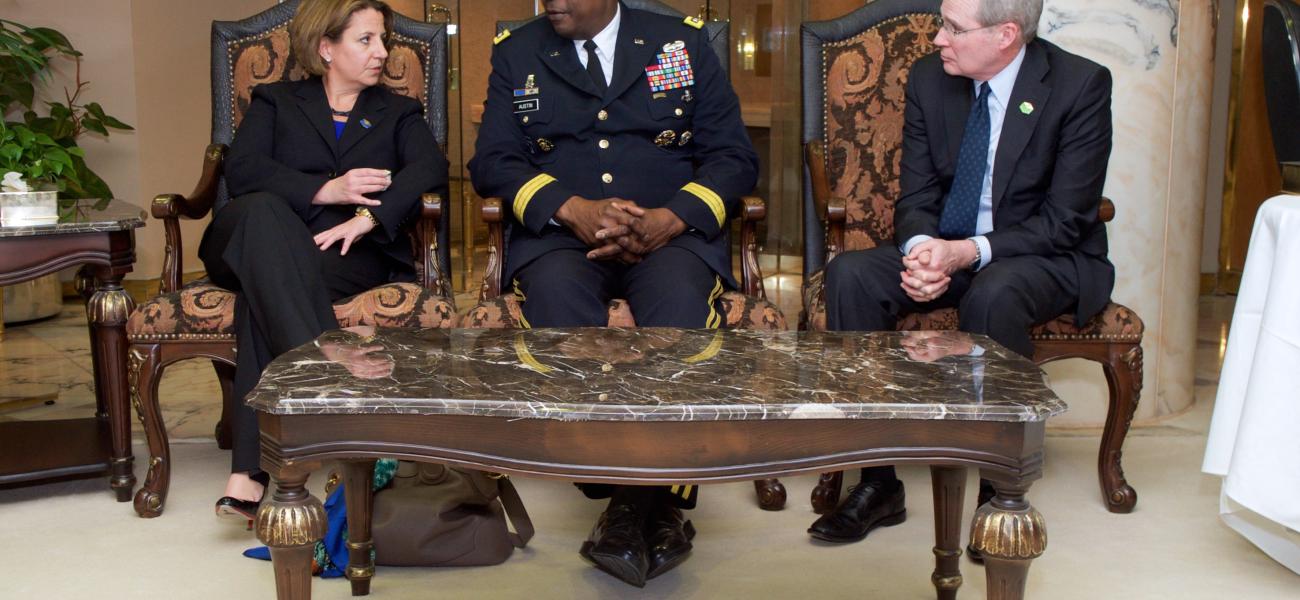
Stephen Hadley on the Major Challenges Facing the United States Today
This is a summary of an interview originally published by Belfer Center for Science and International Affairs under the title "Stephen Hadley on the Major Challenges Facing the United States Today."
- Karen Donfried: We find ourselves at an inflection point, as many have noted, given all of the turmoil in our world, whether it's Russia's unjustified invasion of Ukraine or whether it is Hamas' horrific attack on Israel. And we also see this shift of the world's autocracies seeming to deepen their ties. China and Russia might be one example of that.
- Stephen J. Hadley: We saw Russia and China offering the world much more of an authoritative state capitalism mode and method of organizing society. We've seen, basically, a breakdown of the order that was established after the end of World War II and a challenge to that order both from Russia and China. Russia, I think, favors chaos and China favors building an alternative
So, where are we now? The United States, I think, now faces probably the greatest set of challenges we’ve faced in our history. If you think about it, we face a great power challenger with China, which is an economic and diplomatic and soon to be military powerhouse. We have Russia that is seeking to reestablish a Russian Empire, not a Soviet empire, but a Russian Empire in Europe at the expense of Ukraine, Belarus, and maybe the Baltic states and Poland as it tries to regain control over traditional Russian lands. - KD: You said many things that caught my attention, but your comment about China perhaps at this moment preferring calm and Russia preferring chaos, really caught my attention. could be a significant difference between China and Russia over time?
- SH: I think in the short run, however, Putin and Xi are brought together because they both feel that their regimes and their control are threatened by the United States. We don't accept the legitimacy of their regimes… I do think, and Russia experts may call me up on this, but I do think Russia thinks that it benefits by discrediting the United States, undermining our institutions, and in some sense sowing chaos—that Russia will be able to vindicate its own national interests and its vision of the role it should play in the world in the midst of that chaos.
- What could cause China to have some reservations about what Putin is doing? If Putin really has an agenda of trying to restore the Russian Empire in Europe at the expense of his neighbors and puts, in some sense, prosperity in Europe at risk, that's a problem for China, because Europe still is an important market for China. There is a point at which, I hope, Putin will have gone too far even for China. There’s a question of whether China at that point would use its influence on Putin to dial him back a bit. We’ll have to see.
Read the full interview on Belfer Center for Science and International Affairs website.
Stephen J. Hadley
Stephen J. Hadley is a principal of Rice, Hadley, Gates & Manuel LLC (RHGM), an international strategic consulting firm founded with Condoleezza Rice, Robert Gates, and Anja Manuel. He is the former Board Chair of the United States Institute of Peace (USIP), where he continues to serve on the Board of Directors and he is the Executive Vice Chair of the Board of Directors of the Atlantic Council.
Karen Donfried
Dr. Karen Donfried recently stepped down as Assistant Secretary of State for European and Eurasian Affairs. In that role, she served as Secretary of State Blinken’s top adviser on Europe and Eurasia, crafted U.S. policy on the region, negotiated with key foreign officials, testified before Congress, engaged with media, represented the State Department in interagency meetings and at public events, and led the largest regional bureau at State with 12,000 employees covering 50 countries during Russia's war against Ukraine.
The opinions expressed herein are solely those of the author. Photo by the US Department of State shared under a United States government work licence.

